- Home
- Alan Scholefield
Never Die in January (A Macrae and Silver Mystery Book 2) Page 12
Never Die in January (A Macrae and Silver Mystery Book 2) Read online
Page 12
“Cheers.”
“Cheers. Did you know the previous tenant?”
“Saw her once or twice. Gerald brought her by. Pale little thing. Gerald knows everyone. Or says he does.”
Again there was the slight undercurrent of malice.
“I wonder why he takes that great dog around with him?” she said, attuning herself to his mood.
“Macho man.” He pronounced it “macko”. “Anyway, let’s not talk about Gerald. Another?”
She saw that he had already finished his drink while she had hardly sipped hers.
“No? A duplicate, Mustapha, please.”
“It’s strange being in a place where the previous tenant was so unhappy.”
“Unhappy?”
“Well, she must have been. She killed herself.”
“Let us not be gloomy. She is dead beyond recall.”
“You’re right. Let’s not.” She took another sip. The sherry was dreadful, it tasted as though it had been manufactured out of chemicals. “Gerald was saying that his mother worked with you.”
“For me. She was my typist.”
“Oh, I thought she was a partner.”
“Good God! Mavis? Not on your life.” He laughed at the absurdity of it. “Damn good sergeant-major, but never an officer — if you get what I mean?”
“I think so.” And then abruptly she said, “Were you in the army?”
He touched his tie. “Royal Hants Fusiliers. Why?”
“I just wondered. You have a military bearing.”
He touched his silvery grey hair, then said, “Don’t be fooled by Gerald. He sounds public school but isn’t. Mavis did her best for him. She was as tough as old boots.”
“So you took him in?”
“Well, I saw some promise there. Felt a bit sorry for him too after she’d worked on him. There’s just so much you can knock into someone. I mean you’ve got to show a bit of kindness, damn it all.”
He fitted a cigarette into a black holder.
Click.
Into the frame of memory came Aldershot and Bordon and a dozen other bleak army camps. The rows of married quarters. The clubs in Cyprus and Malaya that in retrospect reminded her of the Zanzibar. Her father, Major Victor Isard. Later, in civvie street, the Major.
This was the kind of place he would have used. There were dozens of them twenty years ago: bamboo, palm trees, Formica. And had he lived he might have looked and dressed like Harold Marshall: gents’ natty suitings, cigarette holder, membership of the Zanzibar. Boozing here all day with men who were also anachronisms, then staggering off home to beat the daylights out of his wife — and his daughter if he could catch her.
“I have to be going,” she said.
“Look here, Irene…” He placed his hand over hers. “What about a spot of lunch? Not here. There’s a Thai place across the road. Not at all bad.”
“Some other time,” she said and twisted her hand away.
“Right…absolutely…some other time.”
Leo Silver was out of his depth. He needed someone to talk to, needed someone to guide him. Above all he needed Macrae, yet he was the one person he couldn’t go to. The thought of going to Scales had not even entered his mind.
He was not given to self-doubt. But today he was feeling somewhat sorry for himself and he knew why: it was isolation, plus being burdened with something he considered grossly unfair. He was angry with Scales. He was angry with Macrae. He was angry with circumstances.
He phoned Zoe.
“Lunch?” she said. “Yummy. Where?”
“I’ll meet you in Hyde Park at the Albert Memorial.”
“I know a marvellous Italian place just off Knightsbridge. What did you do, stick up a bank?”
She was waiting for him dressed in a black coat and white cashmere scarf and black knee-length boots. He felt like rushing her across to the nearest hotel and giving her something to remember him by.
She looked into the brown paper bag he was carrying which contained two tuna-salad sandwiches and two coffees.
“What an original idea,” she said, as they sat on the steps of the Albert Memorial. “A picnic in midwinter.”
But Leo was too preoccupied to respond. “I found out something about Artie Gorman that could make a difference,” he said. “To Macrae?”
“If I can play things right.”
“That’s why the picnic? Boy sleuth needs help?”
“It’s just that I’ve got no one else to talk to about it.”
“Thank you, Leo, that’s nicely put.”
He took a foolscap envelope from his coat pocket and drew out two sheets of paper. “The first is from Criminal Records at the Yard. Honest Arthur had quite a bit of form in his early career: there’s receiving stolen property…fraud…a little mild extortion…a year, two years, some suspended. Then later he becomes respectable. And there’s no link with a murder on Primrose Hill — or anywhere else for that matter.”
“So that lets out Stoker.”
“Not necessarily. Just because there’s no reference doesn’t mean Arthur didn’t get him to do it.”
“No, what I meant was it means you haven’t got anything to frighten Stoker with. You can’t go to him and say, “Look here, Stoker, old bean, you’d better not, etc…etc…””
“You’re sending it up.”
“Only because you’re so grim-faced about it. Anyway, I know you too well. You didn’t invite me out for this delicious lunch — by the way it is fish isn’t it, and not some sort of soya thing? OK, OK — well, you didn’t invite me here just to say you had nothing.”
“No.”
“Good. Because I’m freezing.”
“Her name is Slattery.”
“Whose name?”
“Molly Gorman n6e Slattery. Says so in Artie’s file. With the date of the marriage, etc., so I thought, you know, that I’d run a check on her.”
“And?”
“Nothing in Criminal Records. Clean as a whistle. But…” He lingered on the word.
“I knew there was a but. Come on, Leo.”
“So I asked at the General Registry.”
“Never heard of it.”
“No reason why you should. It’s also at the Yard. It keeps a record of any correspondence or any contact the general public has with the police. There’s nothing there about Artie Gorman — ”
“Molly Gorman née Slattery?”
“Right.” He looked around at the surrounding area at the base of the memorial as though expecting to be overheard and then, in a lowered voice, said, “She was an informer.”
“A police informer?” The levity had vanished.
They stared at each other in silence as she digested this piece of information.
“This was long ago, before she married Artie. She was only a kid really but she was mixed up with people who were mixed up with the Krays.”
“Didn’t they make a movie about the Krays?”
“A kind of British Godfather. You wouldn’t go to it. The point is the Krays are like royalty to the villains in the East End. Even though they’ve been inside for years the people there still revere them. What d’you think Stoker would do if he found out Molly had been an informer? I mean to people like Stoker you can’t get any lower.”
“Cherchez la femme, “ she said.
“Right.”
All Gladys wanted was to get back to her flat.
When she was in it and the noise from next door was unbearable, she would have given anything to be somewhere else.
But not now.
Now it was home. Sanctuary.
She had been humiliated. She was frightened. Ahead lay no man’s land. Behind was Mr Geach.
He hadn’t recognized her. That had been the first thing. Simply hadn’t known who she was or what she was talking about. He was eating — a pork pie, she thought — and he said, “Didn’t you see the notice? Can’t you read?”
He had spoken with his mouth full and for a moment she had not
understood him. He got up from his desk and held the door so that she could see the notice. It said: “Closed for Lunch 1-2 p.m.”
“I’m sorry,” she said.
“You people are always sorry.”
She adjusted her scarf and settled her handbag under her arm but made no move to go.
The tufts of hair on Mr Geach’s head seemed, like transplanted grass, to be dying.
“I’m having my lunch. Come back later.”
It had taken courage for Gladys to come at all and she could never do it twice in one day, specially when the afternoon began to draw to a close — which wasn’t much later than half-past three these days.
“I come about the money,” she said.
“What money?”
“The administration costs.”
He peered at her, his jaw working all the while.
“You been before?”
“Just the other day. It’s Mrs Twyford. Rosemary.”
She explained their previous meeting.
“Oh, yeah, didn’t recognize you in the scarf.”
“Five hundred pounds, you said.”
He gave her a calculating look. “In cash.”
“In cash.”
“And then there’s the Stamp Duty.”
“The Stamp Duty? What’s that?”
“You got to have Stamp Duty. It’s the law. Makes everything official.”
“How much is that?”
“That’s another fifty.”
“So it’s five hundred and fifty?”
“That’s it.”
She paused. He took a bite of raised pastry.
“I been thinking,” she said. “I’ve only got my pension and Mr Twyford’s. I could pay you — I worked it out — I could pay you five pounds a month for the administration costs — and the Stamp Duty.”
He looked at her in disbelief. “On the never-never? You must be joking! You want to move from Rosemary to Briar and you want to pay five pounds a month? There’re old folk who’d give their left arms for a flat in Briar.”
“It’s all I can afford.”
“Don’t waste my time. Don’t come round here with your five-pounds-a-month talk. Why that’s…For Christ’s sake it’d take nearly ten years!” He lost his temper. “Go on, get out!”
She found herself outside his office. She was trembling from a mixture of humiliation and anxiety. It had seemed so reasonable. She’d worked it out in the depths of the night. And he’d lost his temper.
She had to get home. She could make herself a cup of tea and go over things. Think things out, as Eddie used to say.
There had to be a way.
Start, she said. Put one foot ahead of the other. She was talking to bulldog even though he wasn’t there.
Soon she would be at Rosemary.
And don’t look up, no matter who said what. No eye contact.
She began her journey.
The fog was being swept along by a brisk and freezing wind. And it swept Gladys Twyford along with it. She was propelled along the concrete paths, past the car wrecks and the broken playground.
But she did not notice them. All she saw, as the wind pressed into her back, were the cracks in the paths through which weeds were struggling.
Then she saw a foot in a boot, then another and another. Army boots.
Before she could stop herself, she glanced up. They were standing in a semicircle, five of them, looking at her.
Oh God, she thought. Them.
Quickly she lowered her eyes and stepped on to the muddy grass.
They stepped off too.
Terror gripped her.
One of them said, “She’s the old bitch from Rosemary. The one with the husband who was a copper.”
“But he ain’t no more,” said a second.
“Pisshead,” said a third.
They were a blur to her. She could not recognize individuals. God knew how old they were: fourteen? fifteen? They all looked alike to her.
“Where you going, you old cow?”
“That’s not nice. Not an old cow. You got to respect old age. Call her missus.”
“Where you going, missus, you old cow? That OK?”
“Croucher. Why you crouching, Croucher?”
“Missus Croucher.”
Hilarious!
“Gi’ us your bag, you old crouching bag.”
Fantastic!
They pulled her bag from under her arm.
They’re going to rape me, she thought. They’re going to take me into one of the deserted hallways and all of them are going to do it. Gang rape. The phrase had lain dormant in her mind. Now it was out — like a tiger.
They emptied the bag on the ground: pension-book, keys, comb, pills, letters, Eddie’s long-service medal. They kicked them.
“Any money?”
“Couple of quid.”
One reached forward, grabbed the headscarf, and pulled it down over her eyes.
They turned her round and round.
Brilliant!
She reached out her hands to stop the spinning world and the earth came up into her face. She tasted mud.
By the time she had managed to collect her senses and regain her sight, they had gone: a line of young boys disappearing into the mist.
She found she was making a continuous dirge-like sound. There were no tears, just this anguished noise.
She came up on her knees and began to collect her things, her bits and pieces that had been trampled into the mud.
CHAPTER XV
Macrae parked the Rover at the end of the short street and eased his big body into a more comfortable position. He would have liked to change the angle of the seat so he could lie back but, like several other knobs and levers in the car, the knob that controlled the seat no longer worked.
Billy Rampton wasn’t home. He’d called a short while before. He didn’t just want to walk in on him cold. He’d have to now.
His stomach was full of wind and there was a sour taste in his mouth. Sausages and two pints of beer for lunch hadn’t been the best idea but he knew that no matter what he’d eaten the result would have been the same. Ever since he’d had the barney with Stoker he’d been feeling more and more tense. He’d been smoking and drinking more than usual with the result that his stomach had gone bad on him.
He was aware that the next hour or so was going to be bloody awful. Going to someone like Billy for money was a humiliation Macrae could hardly bear, but it would have been ten times worse going to a fellow officer.
But there was simply no other way.
He’d even considered going back to Molly, begging her for old times’ sake. But when he recalled her face after the things he’d said about Stoker he knew there was nothing she would do. She might even tell Stoker — probably would — and he could not stand the thought of that.
A car pulled up outside number forty-nine. It was dusk and Macrae could only’ make out a shadowy figure. But the figure unlocked the door and went in. Billy Rampton had come home.
Macrae waited another few minutes, then he strolled along the street and rang the bell.
It was a small terraced house with a bow window at the front. In the old days the room would have been called the front parlour. They’d had a front parlour when Macrae was a kid. Only used on Sundays or when there were visitors. He remembered the three-piece suite. It had come from one of the cheap furniture shops in the Lothian Road in Edinburgh: fake leopard-skin with black leather inserts.
He rang again.
He thought he saw a curtain twitch. Billy was playing things very close to the chest.
“Billy!” Macrae called through the letter flap. “It’s George Macrae.”
He heard a step, then the rattle of locks, then the drawing of serious security bolts. The door opened on a chain. The passage was dark.
“George?”
“Yes. It’s me, Billy.”
The chain came off. “Come in, George.”
Macrae entered the dark, chilly hallway
and the door was quickly locked and bolted again. He found his hand being pumped.
“George! Christ, it’s good to see you. It’s been a long time.”
“Aye. A long time.”
He followed Rampton into the sitting-room/parlour. Rampton made sure the curtains were tightly drawn then he put the lights on. “Can’t be too careful,” he said.
Macrae glanced around. The room was anonymous, just greys and fawns with artificial leather furniture and a gas-log fire. He hadn’t seen Billy for several years. He would not have recognized him. At Savile Row police station he’d been the man you didn’t want to trifle with, not if you were a villain, not if you were another copper: big, black-haired, black-eyed.
“You heard then, George. It’s bloody good of you to come round. Haven’t seen any of the old firm. Not one. Here let me get you a drink. Scotch was always your tipple wasn’t it?” He began to search in cupboards. As far as Macrae could see they were filled with empty cider flagons.
Was this Billy Rampton? The Billy Rampton?
The man on his knees searching through cupboards of empties was hardly even the ghost of Billy Rampton. He had lost weight. His clothes hung awkwardly on his bony frame. There was a long angry scar on the side of his head and Macrae could see little puncture marks where stitches had been removed.
“Thought I had some, George…What about cider?”
“Don’t worry.”
“No, no, we must.”
He found a half-full flagon. The cider was flat and smelled horrible but George raised his glass. “Here’s to you, Billy.”
“God, it’s good to see you, George. I knew…I bloody knew that if anyone came it would be big George Macrae. When did you hear what happened to me?”
Macrae played safe. “Only a couple of days ago.”
“Jesus, news used to travel quicker than that. Anyway, no matter…No fucking matter…Sit, George. Sit. Listen, have a cigar. You used to smoke those thin cigars didn’t you?”
“Aye. Still do.”
“See? Memory still bloody good. I used to have some. I’ll have a look.”
“No, no, Billy. I’ve got plenty.”
“You want a cigarette?”
“Never use them.”
“Bloody wise.”
Billy lit a cigarette and inhaled deeply.

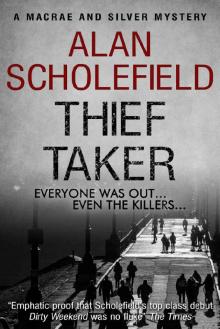 Thief Taker (A Macrae and Silver Mystery Book 3)
Thief Taker (A Macrae and Silver Mystery Book 3)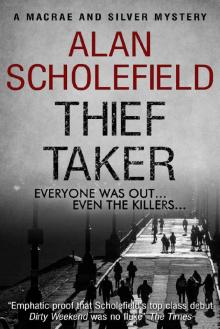 Thief Taker
Thief Taker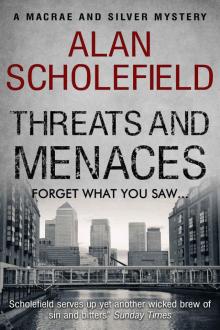 Threats and Menaces
Threats and Menaces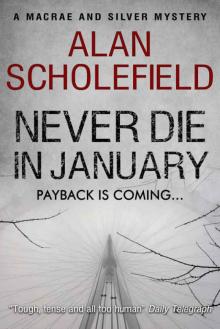 Never Die in January
Never Die in January Venom
Venom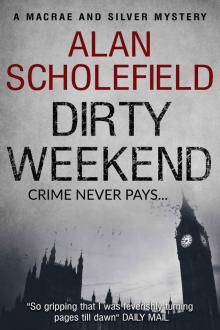 Dirty Weekend (Macrae and Silver Book 1)
Dirty Weekend (Macrae and Silver Book 1)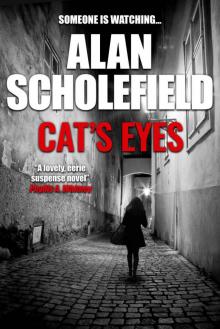 Cat's Eyes
Cat's Eyes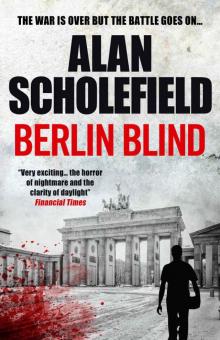 Berlin Blind
Berlin Blind The Sea Cave
The Sea Cave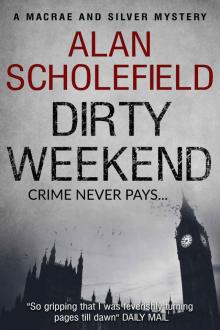 Dirty Weekend
Dirty Weekend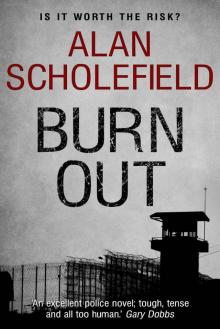 Burn Out (Dr. Anne Vernon Book 1)
Burn Out (Dr. Anne Vernon Book 1)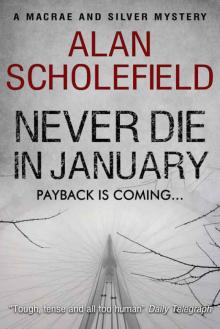 Never Die in January (A Macrae and Silver Mystery Book 2)
Never Die in January (A Macrae and Silver Mystery Book 2)